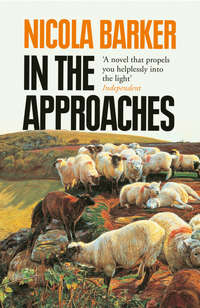
Полная версия
Behindlings
‘No,’ his companion interjected calmly, ‘you have a private deal with a large shoe manufacturer. I believe the formal term is sponsorship.’
Arthur gazed down at his boots. He could smell his own guilt as patently as the shrill tang of disinfectant bleeding from the pine needles crushed under his soles.
‘Which was actually rather…’ his companion pondered for a moment, ‘rather audacious on your part, come to think of it.’
Arthur considered this. He considered the word. Audacious. He paused. Audacious. Yes. He drew a deep breath. His back straightened. His chin lifted again. He stopped pretending.
‘So,’ he said, his voice hardening, ‘does moving up a level –I believe those were your words –does moving up mean that you’re to be held wholly responsible for that boy drowning recently?’
His companion stiffened; his beam faded. ‘He wasn’t a boy. He was twenty-eight bloody years old. Don’t you read the papers?’
Arthur shrugged. He looked down, modestly, his insides warming. His companion walked to the opposite side of the path, leaned against a Scots Pine and then peered up tentatively into its branches, as if expecting to see a wild little monkey dangling among its boughs.
Arthur strung his fingers together. His confidence burgeoned.
‘I did read the papers,’ he muttered eventually, but without any hint of brashness, ‘I read about the Treasure Hunt. I followed the clues.’
‘No,’ his companion interjected, unable to help himself. ‘No. Not a Treasure Hunt exactly…’
‘Oh God. But how… how imprecise of me,’ Arthur’s mean lips suddenly served up the thinnest of grins, ‘and how stupid. Of course not. You called it a Loiter, didn’t you? A Loiter,’ Arthur unstrung his fingers and then hung them, instead, slack and loose between his bony thighs, ‘because our good friend Wesley invents special words for things, doesn’t he? He thinks words make things special. He wants every action to be particular, to be… to be individual in some way. And you know what?’
No time for a response; Arthur rushed on, regardless, ‘I honestly –I mean I honestly – believe that Wesley is actually self-obsessed and arrogant and vain… and vain…’ Arthur lunged after this word hungrily, and when his mouth finally caught up with it, his tongue literally wriggled with the physical pleasure it accorded him, ‘and vainglorious enough to seriously think that this curiously irritating custom of his –this silly habit, this novel facility –gives him some kind of special premium on originality. Not just that, either, but on… but on morality itself, even… You know? Some kind of God-given… some kind of…’
Arthur’s fingers were now twitching so violently as he struggled, a second time –and failed, quite notably –to find the word he was searching for, that he actually looked as if he was playing scales on an invisible Steinway (right there, in the forest), or practising something impossibly fast and fiddly by Liszt or Stravinsky.
And while he continued to grasp –helplessly –for this infernal word that evaded him so absolutely, his eyes –previously glazed and grey –seemed to moisten and widen (their pupils dilating), his cheeks (previously sallow and sunken) grew ripe as sugared plums in an autumnal pudding (a crumble, a fool, something tart, something hot, something sticky), until he looked like a man who’d swallowed down a large lump of gristle much too quickly –without chewing properly.
But Arthur was still breathing. He was not halted or suffocated or silenced by what was happening. He was still vital. He was still active and still functioning. If anything, he’d been galvanised. He’d been enlivened. He’d been pinched –slapped –spanked –thrashed by an intoxicatingly hard whack of righteous propriety. An exquisitely addictive, high-minded, bare-fisted, low-church-style sanctimony. His rage was not only pious, it was borderline biblical – it was Abraham’s wife Rachel, trapped, temporarily, in a violently impotent maternal frenzy.
Arthur’s companion (still leaning against his tree), observed Arthur’s long, lean fingers racing, the deep colour in his cheeks –his lips –and a tiny quirk of satisfaction began to lift his brow a way. Yet before it was completely risen, before it could settle, unequivocally, Arthur’s fingers abruptly stopped their fluttering. They fell back between his knees again. He suddenly grew still, the colour draining from his face –at speed –as if somehow repenting the too sensual flush of its former flowering.
‘The sad truth of the matter…’ finally his voice re-emerged from the icy depths of his sudden stasis, ‘the sad truth is that Wesley’s been brainwashed by his own publicity. Brainwashed to the point that he actually, honestly believes in all that rubbish he’s been spooning out over the years. All the lies. All the humbug. All the ridiculous chic… chic… chicanery.’
Arthur stumbled, quietly, on his final delivery. But even this stutter couldn’t trip him up. It couldn’t silence him. Not utterly.
‘The bald truth is that he’s watched too much bad TV,’ Arthur spoke almost regretfully, inhaling again, eventually, with some difficulty. ‘Yes. That, and he’s been lucky. He’s landed on his feet a few times when by rights he shouldn’t have. He’s milked his opportunities. And finally, to top it all off, he’s jumped –and so… so wholeheartedly, with such flagrant, such obvious, such embarrassing rapaciousness – onto this whole, madly convoluted, New Age environmental bandwagon. All that ludicrously pat Third Wave jumble. All that Alvin Toffler “Small is Beautiful” crap.’
Arthur sniffed, somewhat haughtily, ‘I mean it’s all been very timely. No point denying it. And he’s certainly taken the opportunity to read up on a little bit of pretentious French philosophy. He’s sharpened his act. He’s honed it. And I’m sure…’ Arthur’s voice was growing louder, his hands were picking up tempo again, were playing again –The Death March now, real-time, then double-time, then just plain madly, ‘I’m certain he thinks he’s a thoroughly modern hero. Like something from Rousseau. Or Nietzsche. Or, better still, an anti-hero. In fact I’m positive he thinks he’s a genius. And there are plenty of fools out there more than happy to go along with his delusions. But not me. I’m not one of them. Because he isn’t a genius, and I’ll keep on saying it. He isn’t a genius. Far from it. He’s puerile. He’s a shithead and a fathead and a peacock. He’s… He’s…’
Arthur stopped again, mid-flow, swallowed hard, twice, as if to keep something down, to push it back, ripped off his baseball cap (as if longing to keep his fingers distracted) and then continued talking, but glancing up now; connecting, engaging, projecting, speaking more carefully, more plainly, ‘A Loiter,’ he rotated his cap in his hand, pulling gently at the lining, as if testing its solidity. ‘It’s a movement –a violation, of sorts –but slow and calm and casual. It’s an invasion, isn’t it? Or an infringement? A trespass. It’s slippery. It’s untrustworthy. It’s stupid and it’s pointless. In actual fact it’s just like… it’s just like Wesley. It expresses him perfectly.’
Arthur shook his head, slowly, as if in wonder, ‘A Loiter.’ He rolled the word around on his tongue, ‘It’s actually quite pathetic, when you really come to think about it. It’s unformed. It’s adolescent… And yet,’ he looked up, keenly, ‘didn’t the company end up adopting the phrase? Didn’t you adopt it, I mean personally?’
Arthur’s companion grimaced, as if taken aback by his pointed ferocity, but then he shrugged, ‘We might’ve used it in the initial publicity, for a price, but –and let me emphasise this fact quite categorically –in this particular context it had nothing whatsoever to do with either mischief or risk. That was our proviso. And obviously there had to be a worthwhile prize at the end of it all, an incentive, a reward…’
‘So you called in Wesley,’ Arthur, in turn –even against his better judgement –seemed drawn into himself again, ‘a man infamous as a prankster, as a joker. An out-and-out wildcard. Someone with enough of a reputation for piss-taking to make your average level-headed businessman run a mile. Which –oh dear God –inevitably, from your corner, must’ve made the whole deal feel so shocking, so seductive, so exquisitely… well, transgressive.’
‘Yes. We called him in,’ his companion quickly interrupted Arthur’s unhelpful little river of adjectives, as if in the vain hope of somehow re-routeing it, ‘and initially –I’ll make no bones about it –to start off with, at least, it did all feel rather…’ he paused, nearly sneering, ‘rather audacious. Yes. So we called him in. And eventually –with a little prompting, obviously –he came.’
Arthur didn’t have to try too hard to picture it. ‘At first…’ he placed his cap onto his knee and scratched at his prickly, wheat-coloured chin, ‘knowing Wesley –I mean his type – he was probably fairly reticent. You presumably had your work cut out in persuading him. But you obviously,’ he smiled tightly, ‘you patently rose to the challenge.’
His companion simply shrugged his aquiescence.
‘And in so doing,’ Arthur continued, barely restraining his anger at the very notion, ‘I can only suppose that you told him…’ he held up his hands and counted off each of the virtues he subsequently listed, one by one, on his bony fingers, ‘how much you admired his boldness, his imagination, his integrity, his amazing knack for acquiring publicity. And of course he has his followers –a large and wonderfully gullible ready-made assembly…’
‘Of course. The Behindlings.’
‘And if I know Wesley…’ again, Arthur was forced to qualify himself, ‘I mean if I did know him, I imagine he would probably have demanded complete control. Absolute autonomy. Because only Wesley can hold the reins.’
‘So we hand them over,’ his companion continued, amiably, ‘we give him his autonomy. We let him work out a route, prepare clues…’
‘And it’s all terribly secretive.’
‘Terribly.’
‘But then two short weeks after you release the third clue…’ ‘Yes.’
Suddenly his companion’s bold voice wavered, just a fraction, ‘Yes. The drowning.’ Silence. ‘Fantastic!’
Arthur clapped his hands. They flew together so rapidly, so violently, that they knocked his cap clean off his knee. But he didn’t seem to have noticed. His eyes were moist. His cheeks were taut. For the first time during their lengthy meeting he seemed deeply and unreservedly happy.
‘If you don’t mind my saying so,’ his companion muttered thickly, ‘that’s a somewhat insensitive choice of word, under the circumstances.’
‘I know,’ Arthur looked momentarily abashed, ‘forgive me.’
‘Forgive you?’ His companion smiled, cheerlessly, ‘Why? You hate him. And it’s a perfectly natural reaction.’
Arthur started, looked slightly surprised, and then, seconds later, almost guileful, ‘Me? Why should I hate him? I’ve never even met Wesley.’
His companion snorted. ‘There’s a history,’ he said, ‘why the hell else would I be standing here today?’
Arthur said nothing. He was unhappy again. Deflated. Some things were unmentionable. Histories, especially. ‘So he hurt somebody I knew once,’ he offered, finally, ‘that’s all. It was only carelessness. And it was a long time ago.’
‘Of course. A very long time. And you probably might prefer to try and forget all about it…’ Arthur’s eyes flared. To forget? How could he? ‘But I’m afraid,’ his companion’s rich voice dropped, effortlessly, to almost a murmur, ‘that’s not quite what I’m anticipating.’
‘Why not?’ Arthur spoke normally, but the question reverberated on the quiet, tree-lined path with an almost unnatural clarity, sending up a blackbird from a low branch behind him. The bird chattered its fury.
‘Why not?’ His companion’s eyes followed the angry bird. ‘Because lately I’ve become the unwilling recipient of a certain amount of…’ he paused, ‘pressure. From colleagues who aren’t at all happy about how things have been panning out –with Wesley –with the Loiter. Perhaps they feel, in retrospect, that Wesley was a rather poor bet. These are people –as I’m sure you can imagine –who don’t at all value adverse publicity.’
Arthur grimaced. He did not need to imagine. He knew these people. Their complacency. Their serenity. Their ease. He loathed them.
‘So I’ve come under a certain amount of pressure…’ as his companion spoke he left the shelter of his tree, drew slightly closer to Arthur, then closer still, ‘and naturally, after a while, it seemed expedient to diffuse this pressure by contacting a man who had a history with the company, a man who might reasonably be said to have had a history with Wesley, a man with a grudge, an unfit man. I resolved to contact this man in order to quietly suggest that he might conveniently decide to renew his interest.’
‘And if he doesn’t?’ Arthur’s voice sounded flimsy. This was not a good question. Even he could sense it.
‘If he doesn’t? Well, then I suppose I might be tempted to make certain discrepancies, certain inconsistencies in his very private life a matter of more public concern.’
Arthur was scowling. But he said nothing.
‘Okay…’ his companion suddenly crouched down before him, his knees groaning and creaking like a brand new, high-polished leather saddle, ‘you don’t need to know everything, but what you do need to know is that Wesley was entrusted with something very valuable. For obvious reasons I cannot tell you what that thing was. And yes, while he did relate certain strategic points on the Loiter to a small group of us, and provided us with some basic outlines of his general intentions, he by no means told us everything.
‘The final clue, as you probably already know, was announced only three weeks ago, after a certain amount of procrastination. At first we’d considered cancelling the whole thing –as a tribute to the dead man, as an apology –but then the father became involved. The old boy. The scaffolder. You’ll have seen him in the papers.’
Arthur nodded. Yes. He’d seen the old man.
‘So press attention at that point was obviously intense. It still is. But we were handling it. Unfortunately, Wesley then decided to raise the stakes. He broke off all communications with the company. He grew uncooperative. Three days ago he travelled to Canvey…’
Arthur clucked, shrewdly, ‘Ah. Candy Island. Daniel Defoe. The first clue.’
His companion shrugged this off boredly. ‘Of course. It’s a very famous linguistic corruption. But that’s not what concerns you. What concerns you is that I have recently developed some misgivings about Wesley’s intentions. His motivations. His reliability. In short, I have stopped trusting him.’
Arthur sniffed, dismissively, then touched the cuff of his coat to the tip of his nose. A small droplet darkened its khaki. ‘If you suspect fraud you could have him arrested.’
‘Oh yes, before some poor, deluded fool went and killed himself, very possibly. But now it’s much too fucked up. It’s too complicated.’
Arthur still seemed befuddled.
‘I need you to help me,’ his companion continued, ‘I need you to… to involve yourself in some way. I’m surrounding him. I’ll need information. You’ll have to be circumspect. My ultimate ambition is to defuse the situation. I need to understand it. I need to distract Wesley. To… to debilitate him.’
He paused for a moment, then continued on again, silkily, ‘Naturally, you’re not the only person I’m involving. There will be others. They will know different things, but they won’t know everything. Overall, my intention, my need, is to distance the company from the drowned man, from the old boy, and, ultimately, from Wesley. To keep things clean.’
Arthur was silent. But his mind was working.
His companion watched him, benignly. ‘Here’s some advice for you,’ he whispered, ‘I know about the history. I also know that you’re screwing countless different sources for money. I know why. I understand. And if you help me I will ensure that nobody finds out. And I mean nobody. I will do things for you,’ he paused, ‘but if you go to the papers, if you act indiscreetly, there’s sufficient ill-feeling between you and Wesley for me to manipulate that and to use it against you. At this particular point we have no way of knowing what it is exactly that Wesley’s planning…’
Arthur’s eyebrows rose. ‘Perhaps he’s not planning anything. Perhaps he’s just… just…’ he struggled, ‘just plain mooching. Have you even considered that possibility?’
His companion nodded, unmoved by Arthur’s cynicism. ‘Of course we have. But it’s unlikely. This is Wesley, after all.’
Out of the blue, he swung himself forward and moved his two lips right up close to Arthur’s ear. ‘The air around you,’ he whispered gently, ‘it smells of death. Hospitals. Disinfectant. Why? Who is responsible? Will you tell? Will you enlighten me?’
Arthur stiffened. He struggled to stop his hands from trembling. It was just a misunderstanding, that was all. Eventually his companion pulled away again and the warmth of his breath –on Arthur’s cheek, his ear –transformed, gradually, into something quite different; a thing no less intimate, but cool now, and lingering.
Arthur sat and watched quietly as he stood up, slowly, pushing his hands onto his knees for leverage. Those strangely vocal knees, Arthur thought, and listened to them protesting. Perhaps he had room to protest himself? But he did not.
Instead, he remained mute, sucking his tongue and staring dumbly ahead of him, down the path, into the distance. He could not bring himself to speak again. It was simply not necessary. His mouth was so thick and full now with the taste of Wesley.
Three
‘What you did back then was unforgivable. It was mean, it was selfish, it was thoughtless, it was just… it was just plain wrong.’
The man who spoke these stem words –his name was Ted, and he was a fresh-faced but avuncular small town estate agent –did so without the slightest hint, the slightest note, the slightest tremble of disapproval in his voice. His absolute lack of ire was not merely striking; it teetered, it lurched, it practically tumbled head first into the realm of remarkable.
Wesley, to whom this speech had been principally directed (but who didn’t appear to have digested a word of it), acknowledged as much –internally –as he swung himself from left to right on an ancient and creaking swivel chair in Ted’s Canvey High Street office. He was inspecting property details. He was considering renting.
‘Which bad thing in particular?’ he asked idly. There were so many bad things.
‘Which thing? The Canvey thing. In the book. The Katherine Turpin thing.’
Wesley stopped swivelling and glanced up. ‘What? In the walks book? All the stuff about perimeters? That was years ago.’
He liked this man. Ted. He liked his wide mouth, his charming effervescence, his loopy sincerity, his almost-silliness. Wesley appraised Ted’s thick lips as they vibrated, like two fat, pink molluscs performing a shifty rhumba.
‘Two years ago. Twenty-seven months, if you want to be precise about it,’ Ted calculated amicably.
‘Two years? Fuck. Is that all?’
Wesley frowned –as if this was a vexatious detail that had not previously occurred to him –while Ted waved to a passerby through the agency’s large, exquisitely high-polished picture window. It was the third time he’d done so in as many minutes.
‘You seem to know everybody around here,’ Wesley observed drily, turning his head to peer outside, ‘it must be very trying.’
‘Trying? Why?’ Ted didn’t understand. ‘I find people their homes. It’s an essential… it’s a quint-essential service.’
‘I get your point,’ Wesley puckered his lips slightly, to try and stop an inadvertent grin from sneaking out and plastering itself –with unapologetic candour –all over his mouth. Then, in a bid to distract Ted’s attention, he suddenly pointed, ‘There’s a woman. Do you see her? Over in the Wimpy. Sitting in the window, directly opposite the Old Man.’
‘The sun’s in my eyes,’ Ted squinted, then moved to the left a fraction. ‘Ah… Yes. The one in the sweatshirt? Short hair? Eating a doughnut? Looks like a boy?’
‘That’s her.’
‘Who is she?’
Wesley shrugged, ‘I don’t know. That’s why I asked.’
He glanced around him, momentarily nonplussed. It was a neat office. Ted was neat. In fact he was immaculately presented. He wore a dark grey suit from Next, a spotless white shirt and a silk tie with an image of Sylvester the Cat spewed repeatedly in full technicolor onto a noxious, salmon pink background. His two shoes shone like heavily glacé’ed morello cherries.
‘So… Ted, was it?’
Ted nodded.
‘So Ted, are you the boss of this agency?’
Ted did a humourful double-take, ‘Do I look like the boss?’
‘I don’t know. How does the boss look?’
‘Different. Older. Shorter. Brown hair. Glasses. Huge moustache.’ Ted was a strawberry blond.
‘I knew a man like you once,’ Wesley observed, rather ominously, casually flipping through the sheets of property details again. ‘He looked like you, had the same cheerful… no, altruistic notions. Always beautifully turned-out. Then one day he became fascinated by pigeons’ feet, and that was the end of him.’ Ted tried to look unfazed by this strangely baroque influx of information. He almost succeeded.
‘He’d travel around,’ Wesley elucidated, ‘catching stray pigeons and giving them pedicures. He made special splints from old lolly sticks. Eventually he even began constructing his own, tiny, perfectly executed false limbs. Somebody made a documentary about his work and tried to sell it to Channel 5, but I don’t think they bought it. He was involved in radical causes. It frightened the shit out of them.’
Wesley glanced up. Ted was rubbing his clean-shaven jaw with his nimble fingers in such a way as to indicate a certain want of credulity. Wesley scowled, irritated. ‘I’m perfectly serious. He simply couldn’t abide the sight of a bird with a limp. He was mad about feet. Birds’ feet. Loathed human feet, though. If you pulled off your socks in front of him he’d break out into a sweat. It was tragic.’ Wesley gave the forefinger and thumb on his good hand a cursory lick to improve his turning power. ‘Pigeons aren’t indigenous to Britain,’ he observed, helpfully, ‘and that was his beef. His argument was that they were kept domestically, originally, but then they strayed or were abandoned. Yet somehow they were canny enough to adapt and survive. That was partly why he felt such a powerful connection with them. He was temporarily fostered himself as a kid…’
Wesley paused for a moment to inspect a particular sheet, frowned, then continued turning the pages, ‘People think factory farming is a modern phenomenon, but pigeons were kept by the Romans in the fourth century BC inside these huge, airless towers. They had their legs broken and their wings clipped to prevent them from moving…’, he cleared his throat. ‘This friend of mine waged a campaign against lime-use. People put it on their windowsills. Extremely common in the 1970s. Very cruel. Melts the bird’s toes…
‘The point I’m making…’ Wesley stopped leafing and paused for a minute, ‘is that he was actually ridiculously sensitive, underneath all that other stuff. Underneath that thick layer of poise and helpfulness and affability…
‘Right,’ he passed Ted a sheet, ‘this is the place.’
Ted took the sheet and glanced at it, his mind still fully occupied by images of lime and feet and feathers. After a few seconds, though, his eyes cleared and widened. He shook his head. He began to snigger, nervously. ‘You can’t be…’ he managed eventually, shaking his head and trying vainly to hand the sheet back again.







